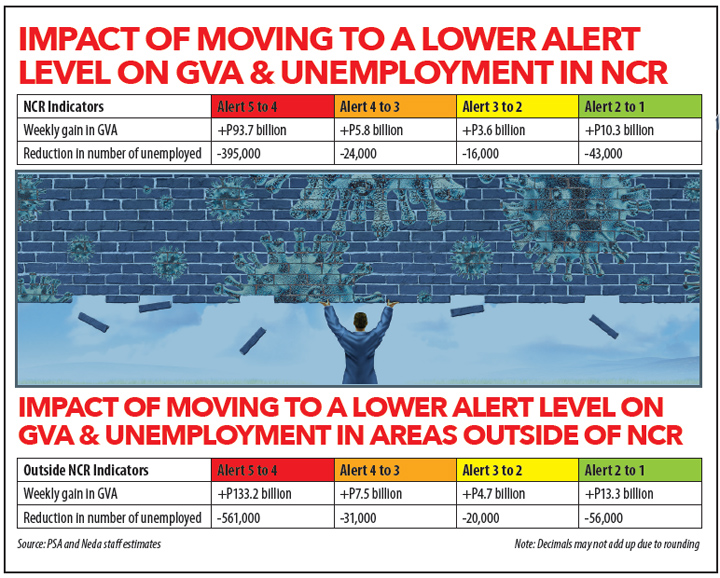
THE Philippine economy stands to gain at least P3.6 billion every week should the Inter-Agency Task Force for the Management of Emerging Infectious Diseases (IATF) decide to place Metro Manila under Alert Level 2 or better from the current Alert Level 3.
This is according to the National Economic and Development Authority (Neda) which also estimated that such a move would reduce unemployment by 16,000 individuals.
The gains for the economy are expected to be greater at around P10.3 billion a week if the National Capital Region (NCR) will be placed on Alert Level 1 from Alert Level 2. This would reduce unemployment by 43,000.
“[These] are very clear indicators why opening the economy will have a direct impact on GDP and the people,” Socioeconomic Planning Secretary Karl Kendrick T. Chua said at a webinar of the Economic Journalists Association of the Philippines (EJAP) on Thursday.
Chua also said that if the alert level of Metro Manila is de-escalated to Level 1 from Level 3, the economy stands to gain around P14 billion a week and unemployment reduced by around 59,000.
Further, Neda estimates also showed that including Areas outside of NCR would also lead to an additional gain of P4.7 billion a week if the alert level is de-escalated to Alert Level 2 from 3. This will lead to 20,000 Filipinos finding jobs.
If the Alert Level is further de-escalated to Alert Level 1 from 2 in areas outside Metro Manila, this would lead to the economy gaining P13.3 billion weekly. This would also slash by 56,000 the number of unemployed.
“We are concerned about Covid and the Delta [variant] but we are also concerned about the hungry people, the jobless people and the children. So I’m glad that we brought this more balanced approach that is why even when we had the ECQ [Enhanced Community Quarantine] to address Delta, it was not like last year,” Chua added.
Chua stressed that real recovery would depend on the safe reopening of the economy, which will lead to jobs and incomes for Filipinos.
This will increase consumption spending and boost GDP. Further, Chua said, this will lead to high revenues that the government can collect to extend “more targeted support” to sectors and people who are in need.
Targeted stimulus
With this, Chua said, any stimulus that can be extended by the government would be better used to help people who could still not go to work due to existing restrictions such as granular lockdowns.
“[This is better] than what we did last year wherein we shut down a big part of the economy and tried to give everyone something when a more effective and sustainable solution would be to open and let the economy function,” Chua said.
On Wednesday, Chua said bringing down the quarantine level of the NCR may happen in a matter of weeks. He said that as of October 25, a total of 55.7 million vaccine doses have already been administered.
This means 30 million Filipinos have received their first dose while 25.7 million got their second or have complete vaccine doses.
Chua expressed concern that postponing face-to-face schooling for another year would further swell the cost to the economy.
Based on studies, Chua said, a year without face-to-face schooling will trigger P11 trillion worth of lost productivity over the lifetime of workers.
This will lead firms and establishments who hire these workers to also see lower productivity. Worker’s productivity will be reduced due to death, illness, and lack of schooling.
Unfortunately, Chua said, the reduction in productivity will be permanent, staying with the child for the rest of his/her working life.
“If we close face-to-face schooling for another year then the P11 trillion becomes, more or less, P22 trillion. That is why I am very hopeful and will work to review the data to see to what extent we can reopen face-to-face schooling soon,” Chua said.
This, Chua said, means the government would also have to review its medium-term budget. The review must be done to close the gaps on education and health which were created by the pandemic.
He said the economic team will work with Congress to refine the 2022 budget and future budgets to reallocate higher funds for health and education which have suffered under the weight of the pandemic.
He also cited the need to accelerate vaccination of all adult Filipinos to reach 70 million by the end of 2021.
This means expanding vaccination sites to include workplaces; removing artificial barriers; and using technology to reduce the waiting and processing time.
“At this point, it is about vaccinating everyone with the least restriction or prioritization as soon as supply comes, my thinking is, we should vaccinate everyone who is available and willing. That will help speed up our achievement of our goal,” Chua said.

